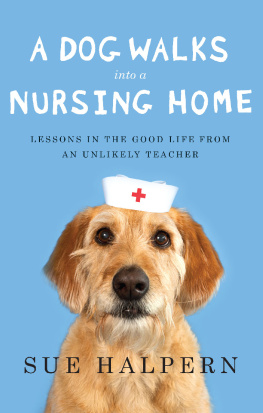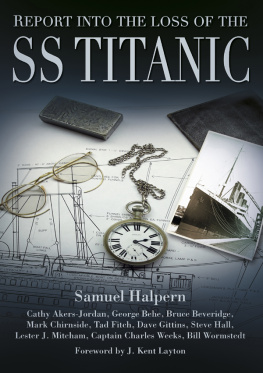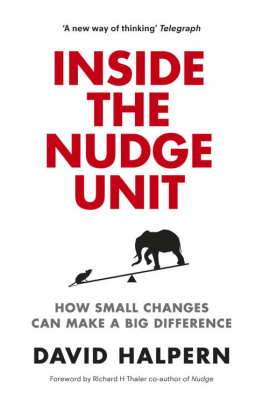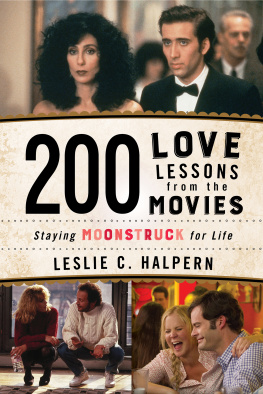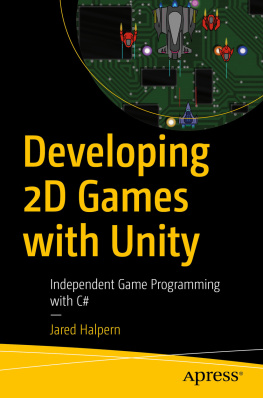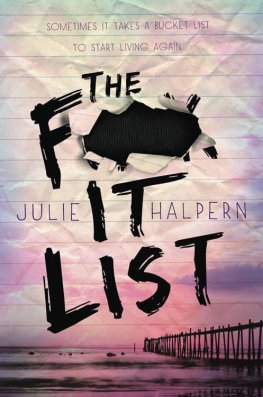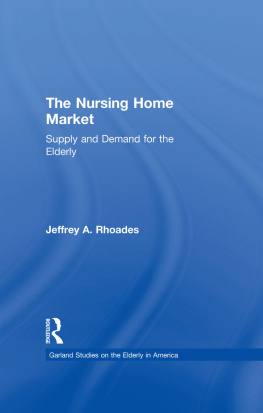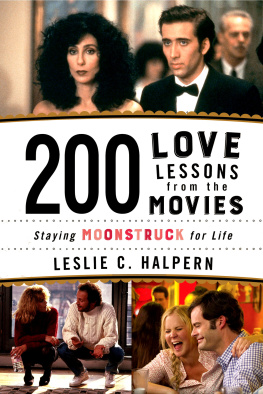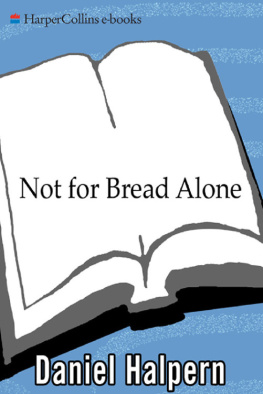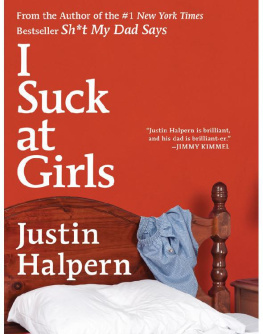RIVERHEAD BOOKS
Published by the Penguin Group
Penguin Group (USA) Inc., 375 Hudson Street,
New York, New York 10014, USA
USA Canada UK Ireland Australia New Zealand India South Africa China
Penguin Books Ltd, Registered Offices: 80 Strand, London WC2R 0RL, England
For more information about the Penguin Group visit penguin.com
Copyright 2013 by Sue Halpern
All rights reserved. No part of this book may be reproduced, scanned, or distributed in any printed or electronic form without permission. Please do not participate in or encourage piracy of copyrighted materials in violation of the authors rights. Purchase only authorized editions.
Published simultaneously in Canada
ISBN 978-1-101-61606-2
Some names and identifying characteristics have been changed to protect the privacy of the individuals involved.
Penguin is committed to publishing works of quality and integrity. In that spirit, we are proud to offer this book to our readers; however, the story, the experiences, and the words are the authors alone.
Introduction
P ransky, my soon-to-be ten-year-old dog, is lying on the living room couch, her body filling it end to end, for though she is not a big dog, she is double-jointed, which means that her hips lay out flat. If I werent typing this Id be stretched out next to her because Im tired, too, as I often am on Tuesday afternoons. Every other day of the week, Pransky is a carefree country dog who operates by instinct, roaming the meadow around our house. But Tuesday mornings we spend time at the county nursing home, going door-to-door dispensing canine companionship and good cheer. Working at the nursing home requires us to pay attentionPransky to me, to her surroundings, and to the people she is meeting, and me to her, to our surroundings, and to the people we are meeting. After three years youd think we would have gotten tougher or more robust, but thats never happened and probably never will.
When I first considered training Pransky to be a therapy dog she was in her late adolescence. Dog years being what they are, she is now about the same age as most of the people in the nursing home. Even so, the words work and walk still get her to her feet in a unit of time that is less than a second. Is she better at her job, more empathetic, now that she, too, is of a certain age? I doubt it. I doubt it because I dont think she could be more empathetic.
As foreign as the nursing home environment was to both of us when we first started visiting County, it was a little less so to me, since my first job was at a medical school in a teaching hospital where I sometimes went on rounds. I was in my late twenties, with a newly minted doctorate, hired to teach ethics to second-year students. This should tell you all you need to know about how seriously that place took the ethical part of medical education: at that age I had about as much experience with the complicated ethical dilemmas of sick people and their families as the second-years in my class had treating sick people and dealing with those ethical dilemmas, which is to say, basically, none. Still, reality was not our mandate. We were supposed to consider what might happen if, and then think through the best then.
The one thing you need to know about modern philosophy is that the operative word in the previous sentence is best. The first thing we had to do in that class was figure out what it meant. Was it what the person in the bed said she wanted, what the doctor wanted, what the hospitals risk manager wanted, what the church (whatever church it was) wanted, what the husband wanted, what the other doctor wanted, what the wife wanted, what the parents wanted, what the partner wanted, what the children wanted? Sorting out what was best was, to say the least, challenging. For guidance, we read works by Kant and Aristotle and Bentham that were harder to get through than the textbooks on human anatomy and organic chemistry, and, for my students, who were itching to get into the clinic, largely beside the point. While I didnt think for a minute that an abstract principle, like Kants categorical imperative, say, was actually going to lead to the right decision on whether or not to give a new heart to a homeless man, it seemed like a reasonable idea, in a place where right answers were often not as black-and-white as they might appear, to inject some of these notions into the future doctors heads. If ideas like these could become part of their mental landscape, then in the future, confronted with that homeless man, they might see the terrain with greater definition.
Historically, when people looked for guidance on how to conduct their lives, they turned to philosophy or religion or both. Thats less true now, as formal religious affiliations drop away and academic philosophy becomes more and more arcane. Its not that people are less inclined to examine their lives or to seek wisdom, its just that they are more likely to look for it in other places: in support groups, on radio call-in shows, from life coaches, on the Internet, in books, or, in my case, inadvertently, with my dog, in a nursing home.
When Pransky and I started working at County, I expected to learn thingshow could I not?though what those things would be I had no clue. I assumed Id learn something about old people, and about the therapeutic value of animals in a medical setting, and about myself in that setting, which was alien and not a little scary. What I found myself learning quickly sorted itself into a template that anyone with a Catholic education, especiallywhich would not include mewould recognize as the seven virtues: love, hope, faith, prudence, justice, fortitude, restraint.
It should be said that the Catholics didnt have a corner on virtue, in general, or on these seven in particular; they just happened to enumerate and, in a sense, popularize them, so when we think of virtue, we tend to think in sevens. But well before Catholic theologians codified their list, Greek philosophers, most notably Plato and Aristotle, offered advice as to the traits and behaviors that should be cultivated in order to live a good, productive, meaningful life, a life with and for others. It was to Platos original fourcourage, wisdom, justice, and restraintthat, centuries later, Saint Augustine added love, hope, and faithwhat are commonly called the theological virtues. These, he believed, both came from God and delivered one to God and, ultimately, to a place in heaven. In our own time, for most people, love and hope and even faith, if you think of it as loyalty and consistency, are unmoored from visions of an afterlife. Still, the virtues remain as guides not only to good conduct but to our betterand possibly happier, more harmonious, most humaneselves.
Happiness, as it happened, was the dominant emotion for both Pransky and me when we were at the nursing home, strange as that sounds, and strange as it was. I didnt go there to be happy any more than I did to learn about hope or fortitude, or to think about courage and faith, but thats what happened. You could say I was lucky, and, in fact, by landing at County, I was lucky. County happens to be blessed with tremendous leadership, a devoted staff, and a larger community that embraces rather than isolates it. I wouldnt presume that it is comparable to any other nursing home. But I do believe that in settings like nursing homes, as well as hospitals and hospices and any other place where life is in the balance, we get to essentials, which is what the virtues are.

